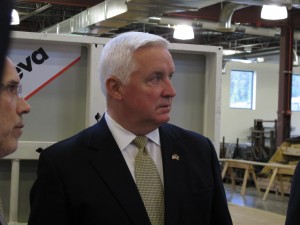Corbett's Marcellus Shale Impact Fee: Day Two

Scott Detrow / StateImpact Pennsylvania
Governor Corbett during yesterday's tour of the Carpenters Training Center
More reaction and analysis on Governor Corbett’s proposed impact fee on natural gas drillers.
The Post-Gazette reports environmental groups aren’t thrilled with the idea, even though it includes provisions like increased setbacks between wells and waterways, and stricter penalties for drillers.
Many of those groups said the governor’s Marcellus Shale gas regulatory package announced Monday amounts to a giveaway of the state’s resources to a gas industry making fat profits and provides no funding for critical environmental programs with statewide benefits.
Jan Jarrett, president and chief executive officer of Citizens for Pennsylvania’s Future, an organization active on Marcellus issues, said the governor’s proposal allows drilling companies to “pay very little for the massive profits they make from Pennsylvania’s resources.”
She said the impact fee “is full of loopholes, unwieldy to administer and leaves too much money on the table.” One of those loopholes “lets the drillers off the hook” for repairing damages to roads and bridges caused by heavy drilling and water-hauling trucks, she said.
The PG also talks to county-level officials who would be implementing and collecting the fee.
On one hand, it’s always difficult to put up a local vote to level a fee, particularly on a competitive industry,” said Doug Hill, the association’s executive director. “But keep most of it at the local makes it genuinely what it is, an impact fee. And it’s certainly a defensible vote.”
In Washington County, which is among the state’s five most-active counties this year for wells drilled, one official said he thought enacting such a fee would be a popular vote locally.
“All you gotta do is come down here and drive around to see the impacts,” said Scott Fergus, the county’s director of administration.
“It could be put to use pretty well.”
The Wall Street Journal provides some context:
A poll conducted last week by Quinnipiac University found that 64% of Pennsylvania residents favor a new tax on natural-gas drillers in the Marcellus, while 27% opposed a tax. The telephone survey of 1,370 registered voters conducted between Sept. 21-26 had a margin of error of 2.7%.
Other states, including Texas, Oklahoma, Arkansas and West Virginia, have taxes based on the value or volume of gas produced at a well site. Mr. Corbett, who was elected last year with strong gas-industry support, has said such a tax on drilling would turn away drillers and jobs.
And, as we mention in this morning’s Drill Bits, the Tribune-Review asks whether a county-by-county setup would lead to unintended consequences.
“They’re shoving it down to the county commissioners to enact a tax against the gas companies so they can say, ‘We didn’t raise a tax against the gas companies, we just said you’re allowed to do it,’ ” Washington County Commissioner Larry Maggi said. It should be mandatory, statewide, he added, echoing the comments of several other county commissioners.
Drillers usually just rent mineral rights and, because they don’t own the land, don’t pay property taxes that counties depend on. This plan tries to undo that inequity, said Doug Hill, executive director at the County Commissioners Association of Pennsylvania. Maggi called it a “godsend,” and several other county officials lauded the move because it gets them the money for cash-strapped programs before sending it to Harrisburg.
That county-based system is the only thing new from Corbett’s announcement, Hill said. Most of Corbett’s plan mirrors the association’s recommendations, but putting the levy in the hands of county officials does create issues, he said. It could lead counties to try to undercut one another at a time when industry officials are asking for uniformity.
“I think our members are going to have some concerns about the potential for border wars,” Hill said. “And the industry I think is going to share their concerns.”
















